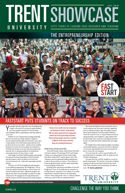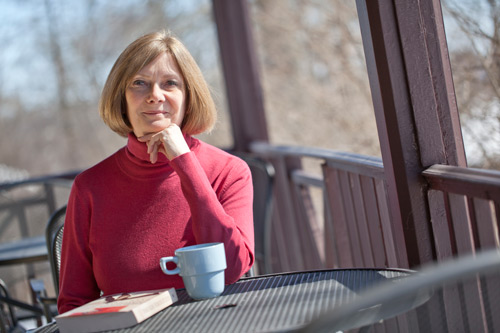
 |
 Welcoming the World to Talk about Canada
Understanding the dynamics of power relations and social protest in Canadian society has been one of the themes animating Dr. Joan Sangster’s research throughout her career at Trent, in both Gender and Women Studies and the Frost Centre for Canadian Studies and Indigenous Studies. These same themes will also be discussed and explored in May, when Trent University hosts a gathering of the brightest minds in Canada and across the globe for “Contesting Canada’s Future,” an international conference on the study of Canada. Canada’s Past, Present, and FutureTrent’s reputation has been built on its commitment to teaching and research in Canadian Studies. It’s fitting, then, that Contesting Canada’s Future is part of Trent’s 50th anniversary celebrations. The idea was originally proposed by the 50th anniversary committee, and an organizing committee, encompassing both Trent faculty and academics from across Canada, was established in 2014 by Professor Sangster. Prof. Sangster, who was the director of the Frost Centre for six years, immediately saw the value of such a conference. “We thought it was a great idea to showcase the study of Canada, not only because it has been a research strength at Trent, but also to provide scholars, activists and artists with an opportunity to debate and discuss current issues of concern — integrating themes relating to Canada’s past, present, and future,” she says. Prof. Sangster’s own research has focused on Canadian law, labour relations, women’s history, feminist theory, and Aboriginal history. Her forthcoming book explores images of the Indigenous North in the post-World War II period. The author of five monographs and seven edited volumes, she is a fellow of the Royal Society and incoming president (2015-17) of the Canadian Historical Association. Prof. Sangster has also taught Canadian history at Duke, Princeton and McGill Universities, experiences that reinforced for her the importance of situating Canadian research in both a national and international milieu. Award-winning and notable speakers lead the discussionAlthough managing such a large conference has its challenges, it also has its rewards. The conference covers themes ranging from environmental policy to artistic practice and will feature a roster of stimulating keynote speakers, including Maude Barlow, Mary Simon, and Idle No More activist Erica Lee. It will also host a meeting of the International Council for Canadian Studies, with academics from across the globe coming to Trent. Special panels will explore art and politics, the future of work, and Canada in the global context. Prof. Sangster hopes that the event will provide an opportunity for intellectual dialogue and awareness about the continuing importance of research that focuses on Canada. As she notes, “People are keen to take this opportunity to engage in an interdisciplinary dialogue about historical and contemporary interpretations of Canada, about the important issues we face today.” The conference has been designed with the goal of bringing the Peterborough, Durham, Trent and international communities together. It will take place at several different local venues, including popular downtown spaces like Artspace and Market Hall, and will end with an event at Trent sponsored by the ICCS. “We’ve tried to build connections that link the local, Trent, regional and national and international organizations dedicated to research and teaching about Canada.” |

































